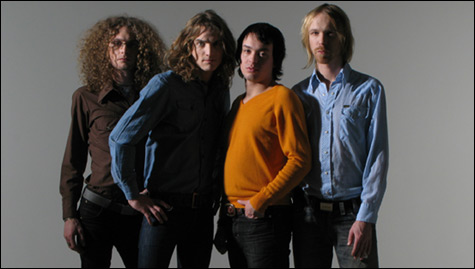
A HEAD FULL OF HIP-HOP?: Gustav Ejstes (second from right) has been listening to Madvillain, MF Doom, Marley Marl, Pete Rock. |
To most rock fans, psychedelic means Jimi Hendrix and Arthur’s Lee’s Love, or Iron Butterfly’s “In-A-Gadda-Da-Vida” and Frigid Pink’s “House of the Rising Sun.” Cream’s Disraeli Gears, Pink Floyd’s Ummagumma and 1966’s The Psychedelic Sounds of the 13th Floor Elevators are other bellwethers. Whatever your psychedelic flavor, one thing’s for sure: it’s an English or American pursuit. Right? Well, beyond myopic Anglo-American-isms, psychedelia also birthed a Euro component in the current home of blitzkrieg pop trends, Sweden.
“There was a great [psychedelic] underground in Sweden in the ’70s,” says Gustav Ejstes, whose band, Dungen, draw from a wealth of seemingly ancient Swede-psych sources. Pugh Rogefeldt, Älgarnas Trädgård, Samla Mammas Manna, Kebnekaise, Bo Hansson, and International Harvester were underground psychedelic bands in ’60s and ’70s Sweden — their sound lives on in Dungen.
“One of the best Swedish bands was called Baby Grandmothers,” Ejstes says over the phone from Sweden. “They were an amazing trio that existed for a year or two. And I like ’60s heavy-metal bands from all over the world that no one knows about. A band from Argentina called Aguaturbia. Like Black Sabbath in Argentina. Amazing records. But now I just have my head full of hip-hop.”
Hip-hop? Dungen’s 2005 album, Ta Det Lugnt (“Take It Easy”), was anything but, and its hotly tipped follow-up on Kemado, Tio Bitar (“Ten Pieces”), extends Gustav Ejstes’s space-shattering sounds. Again handling drums, flute, keyboards, guitar, bass, and violin, Ejstes is joined only by guitarist Reine Fiske. Mining a rich vein somewhere between Hendrix’s Electric Ladyland and Santana’s Caravanserai with hints of the Small Faces and Swedish folk, Tio Bitar recalls past masters in a way that’s more than mere retro navel gazing. In the same way that jazz drummer Jeff “Tain” Watts recalls Elvin Jones, or Derek Trucks summons Duane Allman, Dungen distills psychedelia to its essence, time-traveling from the past to the future and back again.
“When it comes to music and music listening,” Ejstes says, “I pick the good parts that I like, then I learn the codes and the language and don’t concentrate so much on the culture and the scene and the lifestyle. I play music.”
Codes? “Psychedelic music has a way of playing. My guitarist Reine Fiske is incredible, he has this tone language that is totally different from a lot of players that you hear today. And my way of playing drums is just listening; I try to figure out how to play it. Reine is a record collector, and I got these records when I was eight. I listened to Mitch Mitchell, then more obscure Swedish psychedelic stuff.”
And buried somewhere in there is Ejstes’s newfound love for hip-hop.
“I have been listening only to hip-hop,” he confirms. “I like Madvillain, MF Doom, Marley Marl, Pete Rock. I get into different kinds of music. I isolate and listen and I don’t follow trends. I get into something like Turkish folk music. It is a whole scene, a way of living and everything. I just love the music and I want to learn it and play it. The same with hip-hop. I have my picture of hip-hop and I choose some of the parts and leave other parts in the culture.”
Indeed, along with excursions into Turkish folk, Ejstes has been learning the DJ arts of mashing, scratching, and mixing.
“Dungen for me is a music project as much as Swedish folk music. I practice a lot of violin, Swedish folk music, and a lot of turntable, too. Everything influences everything.” He sighs, tiring of questions. “When I play fiddle tunes, I am thinking of rock music, and when I play turntables, I think of Swedish folk music or psychedelic rock. Everything is melting together. It’s all music.”